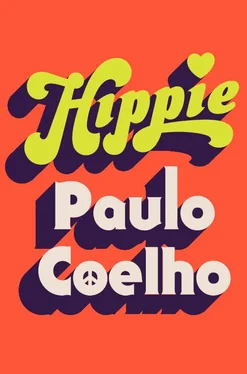He kept walking toward the spice bazaar and thinking to himself: Why didn’t I ever, ever force my parents to leave the fields of Amiens for a bit and go travel? In the beginning, the excuse was that they needed money so their only son could receive a proper education. When he earned his degree in marketing—something his parents didn’t even understand—they said perhaps they would travel abroad for their next vacation, or the one after that, or perhaps the one after that, though every farmworker knows that nature’s work is never finished and that farming alternates between moments of backbreaking work—planting, pruning, harvesting—and moments of extreme boredom, spent waiting for nature to complete its cycle.
The truth is they never had any intention of leaving the region they knew so well, as though the rest of the world were a dangerous place where they would end up lost along unfamiliar streets, in strange cities full of snobby people who would immediately notice their country accents. No, the whole world was the same. Each person had his place and that ought to be respected.
Jacques had often become exasperated as a child and adolescent, but there was nothing to do except carry on his life just as he’d planned: find a good job (he did), find a woman to marry (he was twenty-four when this happened), build a career, travel the world (he did and ended up exhausted from living in airports, hotels, and restaurants while his wife patiently waited at home, in search of a meaning for her life beyond her daughter). At some point he would be promoted to director, retire, go back to the country, and spend the rest of his days in the place he was born.
Looking back all these years later, he thought he could have skipped those intermediary stages—but his spirit and his enormous curiosity had propelled him forward, toward endless hours of work at a job he loved at the beginning and began to hate just as he was moving up the ladder.
He could have waited a little and left at the right moment. He was quickly advancing through the ranks, his salary had tripled, and his daughter—whom he’d watched grow in stages between one trip and another—had begun to study political science. His wife ended up divorcing him because she felt her life had no purpose, and now she lived alone because Marie had found a boyfriend and moved to his house.
Most of his ideas about marketing (a word and a profession then in vogue) were accepted, though some were questioned by attention-seeking interns. He was used to this and soon clipped the wings of anyone trying to “prove himself.” His end-of-year bonuses, based on company profits, grew and grew. Now that he was single again, he had started partying more and found himself girlfriends who were both interesting and out for their own interests—his cosmetics firm was known to everyone, his girlfriends were always dropping hints that they would like to appear in promotional ads for certain products, and he neither refused nor promised. Time passed, the self-interested girlfriends left, and the sincere ones wanted him to marry them, but he already had his future planned: ten more years of work and he would get out at the height of middle age, full of money and possibilities. He would travel the world, this time to Asia, which he didn’t know too well. He would try to learn things that his daughter, by this point also his best friend, would like to teach him. They dreamed of going to the Ganges and to the Himalayas, the Andes and Ushuaia, near the South Pole—after he’d retired, of course. And, obviously, after she graduated.
Until two events shook up his life.
The first occurred on May 3, 1968. He was waiting for his daughter at the office so they could take the metro home; after more than an hour, she still hadn’t arrived. He decided to leave a note at the reception desk in the building where he worked, near Saint-Sulpice (the company had several buildings and his department did not occupy offices in the company’s luxurious headquarters), and left, ready to continue on to the metro alone.
Suddenly, without warning, he saw that Paris was burning. Black smoke filled the air, sirens were everywhere, and the first thing he thought of was the Russians—they’d bombed the city!
But soon he was pushed against a wall by a group of kids running through the street, their faces covered with damp cloths, shouting “Down with the dictatorship!” and other things he no longer remembered. Behind them, heavily armed police launched tear-gas canisters. Some of the kids had tripped and fallen, and those left behind were immediately beaten by the police.
His eyes began to burn on account of the gas. He couldn’t understand what was happening—what was the meaning of all this? He needed to ask someone, but most important at that moment, he needed to find his daughter—where could she be? He tried walking toward the Sorbonne, but the streets were completely blocked, by pitched battles between the forces “of order” and what looked to be a bunch of anarchists from some horror film. Tires burned, rocks were being thrown at the police, Molotov cocktails flew every which way, public transportation had ground to a halt. More tear gas, more shouting, more sirens, more rocks being torn from the pavement, more kids being beaten—where is my daughter?
Where is my daughter?
It would be a mistake—not to mention suicide—to walk toward the conflict. It was best to walk toward home, wait to hear from Marie, and allow everything to pass. It all ought to be over that night.
He had never taken part in student protests, he had other aims in life, but no protest that he had seen had ever lasted more than a few hours. All that was left was to wait for his daughter to call—that was all he asked God for at that moment. They lived in a country with so many privileges, where young people had everything they wanted. The adults knew that if they worked hard they could retire without any worries, continue drinking the world’s best wine, eating the world’s best food, and walking through the most beautiful city in the world without the worry of being mugged.
His daughter’s phone call came around two in the morning—he’d kept the television on; the two public TV channels were showing and analyzing, analyzing and showing, what was going on in Paris.
“Don’t worry, Daddy. I’m all right. I should pass the telephone to the person next to me, so I’ll explain later.”
He tried to ask her something, but she’d already hung up.
He couldn’t sleep at all the entire night. The protests had lasted much longer than he had imagined they would. The talking heads on TV were as surprised as he was. Everything had exploded from one moment to the next, without warning. But they tried to demonstrate calm and make sense of the confrontations between police and students using the pompous explanations of sociologists, politicians, analysts, a few policemen, a few students, and the like.
Finally, the adrenaline had left his blood and he’d collapsed, exhausted, on the couch. When he opened his eyes it was already morning, time to go to work, but someone on the television—it had been on the entire night—was warning people not to leave the house; the “anarchists” had occupied the universities and metro stations, closing streets and blocking traffic. Violating the fundamental rights of every citizen, someone added.
He called in to work; no one answered. He called the headquarters, and someone who had spent the night there because he lived in the suburbs and had no way to get home told him it was useless to try to move around the city. Almost no one, only those who lived close to the office, had managed to make it in.
“It will all be over today,” said the anonymous voice on the other end of the line. Jacques asked to talk to his boss, but like many others, his boss hadn’t gone to work either.
Читать дальше











